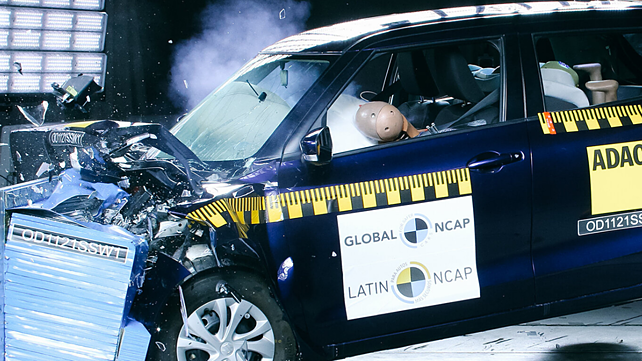
In the latest Latin NCAP tests, the Suzuki Swift made in India and Japan, with two airbags as standard, has achieved zero stars. The popular compact car scored 15.53% in Adult Occupant box, 0% in Child Occupant box, 66.07% in Pedestrian Protection and Vulnerable Road Users box and 6.98% in Safety Assist box. The result is valid for the hatchback and sedan versions.
On the other hand, popular SUV Renault Duster, produced in Latin America and Romania, with double airbags and Electronic Stability Control (ESC) as standard, too achieved zero stars with scores of 29.47% in Adult Occupant box, 22.93% in Child Occupant box, 50.79% in Pedestrian Protection and Vulnerable Road Users box and 34.88% in Safety Assist box.
In case of the Swift, the zero stars result is explained by the poor side impact protection and an open door during the test, low whiplash score due to the lack of UN32 prove for rear impact test, lack of standard side head protection airbags, lack of standard ESC and the decision of Suzuki of not recommending CRS for the test, noted the agency.
It further said that the Suzuki Swift would not pass Regulation UN95 requirements due to door opening. The Swift is sold in Europe with six airbags and Electronic Stability Control (ESC) as standard, while the model in Latin America is not offered with side body and head airbags and ESC as standard. The Latin American version of the Swift still offers a standard lap belt in the rear centre seating position despite the well-known high injuries risks of its use.
Renault Duster fails UN95 test
The new Duster for Latin America does not offer side body and side head protection airbags as standard like the model sold in Europe under the Dacia brand. During the frontal impact test, the model showed unstable structure performance and a fuel leakage. Side impact test showed high intrusion of the B-pillar and an open door during the test.
Door opening in Latin NCAP side impact test, which has same configuration as Regulation UN95, means that the car would have failed the UN95 test.
The fuel leak recorded in the frontal crash test needs further action from Renault, not just to solve the problem in production but to recall all the units sold in the market that potentially have this problem in the fuel tank in a crash. In the same line, the door opening in the side impact requires immediate action by Renault as it poses a serious risks of ejection in the case of side impacts, said the test agency.
Safety features are like vaccines
Alejandro Furas, Secretary General, Latin NCAP said consumers in the region are forced to pay more than the basic price to get to the same safety specs that Renault/Dacia and Suzuki offer as standard in markets like Europe, and in some cases they are not even available in Latin America and the Caribbean.
Basic vehicle safety, which is standard in mature economies markets, is a right that Latin American consumers should claim without having to pay extra for them. “These safety features act like vaccines for one of the most severe pandemics like road traffic injuries and fatalities. Consumers have the right to receive the same vaccine supplied anywhere else without having to pay more for it,” Furas demanded.